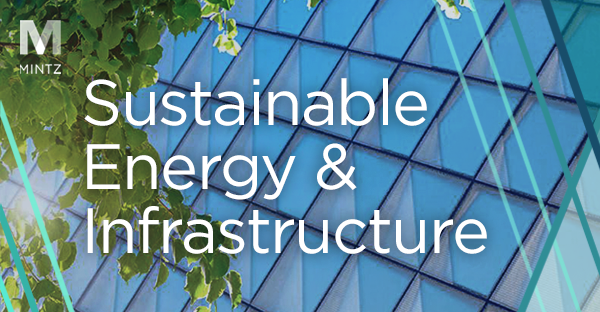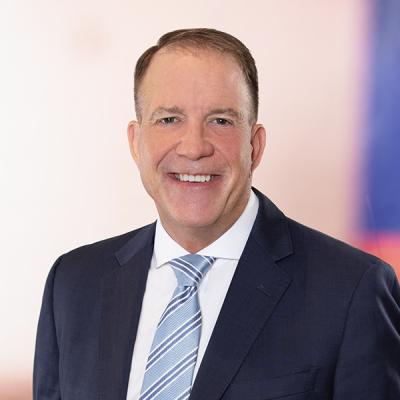Energy & Sustainability Washington Update — November 2024
This month, we wanted to highlight some of the new energy-related programs and announcements from DOD, DOE, and other agencies, as well as other relevant news in the energy and sustainability sector. Next month, we will discuss the results of the presidential and congressional elections and what they could mean for the direction of federal energy policy, building off the views in our August newsletter.
Significant New Funding Opportunity: DoD Office of Strategic Capital Loan Program to Scale Critical Technologies
On September 30, the Department of Defense’s (DoD) Office of Strategic Capital (OSC) announced its first-ever Notice of Funding Availability (NOFA) to provide loans for energy and other technologies that are critical to US national and economic security. OSC loans can be provided for the construction, expansion, or modernization of commercial facilities that create products supporting the 31 covered technology categories (CTC) laid out in the National Defense Authorization Act (NDAA) for fiscal year 2024.
OSC was granted a total loan authority of $984 million, which is available through FY26. For the initial round, OSC expects to make loans in the range of $10 million – $150 million to approximately 10 successful applicants. The remaining funding, if any, will be used for future funding opportunities. Subject to appropriations, OSC expects to publish opportunities in the future for additional CTCs and types of assistance, including loan guarantees.
Like many other federal grant and loan programs, OSC is using a two-step process for companies to apply to the NOFA. Part 1 of the application is open to all eligible parties starting on January 2, 2025 through 4:59 pm EST on February 3, 2025. See below for a list of eligible entities. Applications will then be reviewed by the OSC and prioritized by selection criteria. Eligibility and selection criteria for investments require compliance with the statute, the extent to which the investment supports US national security or economic interests, the impact the loan would have on the project, and the creditworthiness of the investment. Selected applicants will be invited to submit Part 2 applications, which will be accepted on a rolling basis.
Continued on ML Strategies Viewpoints.
DOE Notice of Intents (NOIs)
Funding Notice: $1.3 Billion for Transformational Emissions Reducing Technologies (09/27/2024)
The DOE’s Office of Clean Energy Demonstrations (OCED) announced an NOI to fund up to $1.3 billion to catalyze CCUS tech investments. The DOE anticipates offering funding across three topic areas: capture demonstration projects, capture large-scale pilot projects, and planning and design for networks that can share CO2 transport and storage infrastructure. The announcement seeks to increase private sector confidence in adopting CCUS technologies. The solicitation date will be issued later this fall.
Funding Notice: High Performance Computing for Energy Innovation (10/10/2024)
The DOE’s Office of Fossil Energy and Carbon Management (FECM) announced an NOI for the High-Performance Computing for Energy Innovation (HPC4EI). The program is the parent initiative to both the HPC4Materials (HPC4Mtls) and HPC4Manufacturing (HPC4Mfg) programs, which are designed to support improvements in manufacturing processes and materials performance. This opportunity helps qualified industry partners participate in short-term projects with DOE national laboratories. The NOI anticipates awarding up to $400,000 per project and requires industry partners to provide a contribution of at least 20% of total project funding. The solicitation date will be issued later this fall.
Funding Opportunity Announcements (FOAs)
ARPA-E Announces SCALEUP Opportunities (10/2/2024)
DOE’s Advanced Research Projects Agency-Energy (ARPA-E) announced up to $50 million in open-ended funding for the commercial scale-up of disruptive energy technologies. The SCALEUP Ready program will support advancing technologies from ARPA-E’s portfolio toward market adoption. As a rolling funding opportunity, SCALEUP Ready allows applicants to submit applications at any time while the Notice of Funding Opportunity (NOFO) remains open. There has been no announced date as to when the NOFO will close. Teams may request pre-submission discussions with an ARPA-E Technology-to-Market Advisor and use a self-assessment tool to gauge their SCALEUP readiness for application.
$400 Million in New Funding for America’s Rural and Remote Communities (10/3/2024)
DOE’s OCED opened applications for up to $400 million to support clean energy solutions for rural and remote communities as part of the Energy Improvements in Rural or Remote Areas Program. Funding awards will range from $2 million to $50 million. DOE seeks a minimum 5 – 50% minimum cost share per project. Concept papers are due Feb. 27, 2025, and full applications are due Aug. 28, 2025.
$44 Million for Clean Energy Planning and Deployment on Tribal Lands (09/27/2024)
DOE anticipates issuing $25 million via 20 – 40 awards ranging from $100,000 to $2.5 million for “projects that support the planning, assessment, and development of clean energy for Tribal buildings or on Tribal lands.” Applications are due January 23, 2025.
$4 Million to Advance Solid Oxide Fuel Cell Technology for Clean, Low-Cost Hydrogen Production (09/26/2024)
DOE’s Office of Fossil Energy and Carbon Management (FECM) announced up to $4 million to increase hydrogen affordability across energy efficiency and clean energy applications, including hydrogen energy storage, microgrids, and combined heat and power. The FOA will support R&D efforts around solid oxide fuel cell technology with a focus on reversible solid oxide fuel cell (R-SOFC) systems. Applications are due December 2, 2024.
$19.5 Million to Develop a Secure Domestic Supply Chain of Critical Minerals and Materials (09/25/2024)
DOE’s Office of Fossil Energy and Carbon Management (FECM), in collaboration with the Office of Energy Efficiency and Renewable Energy (EERE), announced a $19.5 million FOA, which looks to reduce costs for recovering critical minerals and materials from domestic secondary and unconventional sources. The FOA’s four areas of interest are critical mineral coproduction from unconventional carbon feedstock sources, heavy rare earth element recovery, critical mineral recovery from produced water, and process diversification across multiple feedstock types. Applications are due Nov. 26, 2024.
$15 Million to Develop Innovative Systems for Clean Hydrogen Production (09/23/2024)
DOE announced up to $15 million to support hydrogen generation efforts, which convert feedstocks (coal, biomass, household waste, etc.) into synthesis gas. Highlighted areas of interest are research around demonstrating entrained flow gasification tech for alternative feedstocks and fluidized bed gasification tech for alternative feedstocks. DOE expects to give up to five awards with a minimum of 20% cost-sharing from the awardees. Full applications are due November 22, 2024.
Requests for Information (RFI)
DOE Solicits Feedback on Its Plan To Increase Products and Materials Circularity (10/9/2024)
DOE’s EERE released an RFI seeking input for its draft strategic framework on circularity for secure and sustainable products and materials, including how to improve circularity, variables involved in circularity, public-private partnership opportunities, and data and analysis to inform their efforts. Responses to the RFI must be submitted electronically to [email protected] by December 16, 2024.
LPO Announcements
LPO Announces Conditional Commitment to EVgo to Deploy Nationwide EV Fast Charging Network (10/3/2024)
DOE’s Loan Programs Office (LPO) made a conditional commitment to EVgo for a loan guarantee of up to $1.05 billion to deploy 7,500 high-power (350 kW) and speed charging stalls across Arizona, California, Florida, Georgia, Illinois, Michigan, New Jersey, New York, Pennsylvania, and Texas. This rollout will include dynamic power-sharing technology and enable unused power from adjacent stalls to be transferred to a charging vehicle. In support of the administration’s Justice40 initiative, the company intends to install more than 40% of new charging stations in disadvantaged communities. The project is likely to see benefits from the 30C Alternative Fuel Vehicle Refueling Property Tax Credit specifically targeted for rural areas.
Treasury Announcements
Treasury’s final rule for manufacturing tax credit important for critical minerals (10/24/24)
The Treasury Department released a finalized rule for the Inflation Reduction Act’s advanced manufacturing production tax credit, 45X, which is available to US producers of clean energy components such as battery cells, solar modules, or critical minerals. After much debate, the final rule makes significant changes to allow domestic mining of critical minerals to be eligible for a 10% cost of production credit and clarifies eligibility for producing components using recycled materials. Taxpayers may include materials and extraction costs if they also process the minerals in the US to a level of specified purity. The tax credit is available through 2032 but begins to phase down after 2029 for most components, except critical minerals. The final rule does not contain a prohibition on funds flowing to foreign entities of concern.
Treasury aims to publish final clean hydrogen rules by year end (10/1/2024)
The Treasury Department said it intends to finalize rules for the IRA’s Section 45V, which offers hydrogen producers a tax credit of up to $3 per kilogram of clean hydrogen they produce. Hydrogen companies considered the initial guidelines issued by Treasury late last year too strict and warned that many of their planned plants wouldn’t qualify for the full incentive. The industry is hoping that this long-awaited guidance will clarify qualification questions and also how to request an “emissions value” determination from DOE. Answers will revive progress with the US’ regional clean hydrogen hubs, which are expected to generate $40 billion in private investment and support 334,280 jobs.
Legislative Developments
The Cool Roof Rebate Act of 2024 was recently introduced by Reps. Valerie Foushee (D-NC), Emanuel Cleaver (D-MO), and Raul Diaz (D-CA). The bill would create a rebate program for reflective roofing products to lower home temperatures and reduce energy consumption and costs. It authorizes up to $25 million in household rebates annually across all 50 states and US territories between FY25-FY29. The bill is endorsed by the American Public Health Association, the Federation of American Scientists, and the Smart Surfaces Coalition.
Rep. David Trone (D-MD) has introduced the Revitalizing Economic Competitiveness of Highway Adjacent Areas with Reliable Green Energy for Electric Vehicles (RECHARGE-EV) Act to revise federal EV charger funding guidelines for small towns. The bill directs the Secretary of Transportation to update the guidance for the National Electric Vehicle Infrastructure (NEVI) Formula Program to increase flexibility within the current Bipartisan Infrastructure Law requirement that EV chargers be placed within less than one mile from a freeway exit or highway, which has largely left small towns without federal assistance. The bill is supported by the League of Conservation Voters, Sierra Club, Third Way, and Transportation for America.
The Hydrogen for Industry Act was introduced by Reps. Eric Sorensen (D-IL), Marc Molinaro (R-NY), Don Bacon (R-NE), Jim Costa (D-CA), and Nikki Budzinksi (D-IL). The bipartisan bill would create a program for hydrogen to be used to produce building materials such as steel, cement, glass, chemicals, and fuel. Specifically, the legislation establishes a commercial-scale demonstration program for hydrogen use in heavy industry; provides competitive grants to hydrogen demonstrations in industries such as iron and steel, cement, chemicals, refining, and other industrial products; and directs the Secretary of Energy, Secretary of Commerce, and Secretary of Transportation to jointly conduct a study on the bill’s impact, cost, and safety. A bipartisan version of the bill was introduced in the Senate last year by Sens. John Cornyn (R-TX), Chris Coons (D-DE), Bill Cassidy (R-LA), Martin Heinrich (D-NM), and Ben Ray Lujan (D-NM).
ICYMI
Utilities ‘caught flat-footed’ as energy demand grows, report finds (10/18/2024)
A report by consulting firm Wood Mackenzie found that utilities will struggle to meet growing electricity demand in the US, predicting 4 – 15% growth in demand through 2029. This demand-side growth, due to surges in data centers, domestic manufacturing, and industrial electrification, lacks supply-side planning from utilities, as new infrastructure typically takes five to ten years to plan and construct. Electricity demand is expected to increase over the next five years by 25,000, 15,000, and 7,000 MW, respectively. Bottlenecks persist across transmission planning, permitting, and construction. Various solutions to meeting this rising demand could include grid-enhancing technologies, collaboration between data centers and utilities, and a more transparent interconnection process.
Amazon, Google, DOE go big on small nuclear reactors (10/17/2024)
Amazon, Google, and the DOE have invested heavily in the development of advanced reactor technology to provide a boost to “nascent energy technology.” Amazon and Dominion Energy expressed that they would explore a 300-MW SMR project close to the North Anna Power Station in Louisa County, Virginia, where the region hosts the largest cluster of data centers in the country.
Amazon inks deal aimed at deploying 5GW of nuclear by 2039 (10/16/2024)
Amazon has signed a $500 million deal with nuclear developer X Energy to bring 5 GW of small modular reactors (SMRs) online by 2039. This builds on an agreement Amazon previously signed with the utility Energy Northwest to develop four advanced reactors capable of generating 320 MW by early 2030. According to Amazon and X Energy, this would be the largest deployment of such reactors to date.




